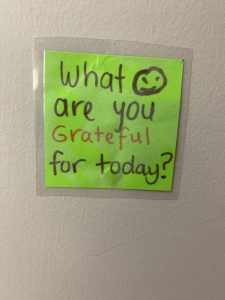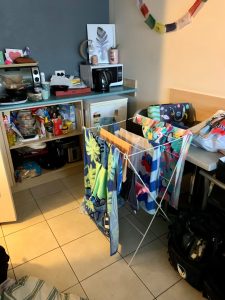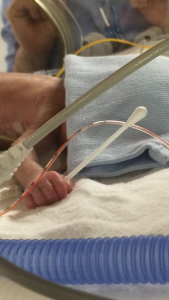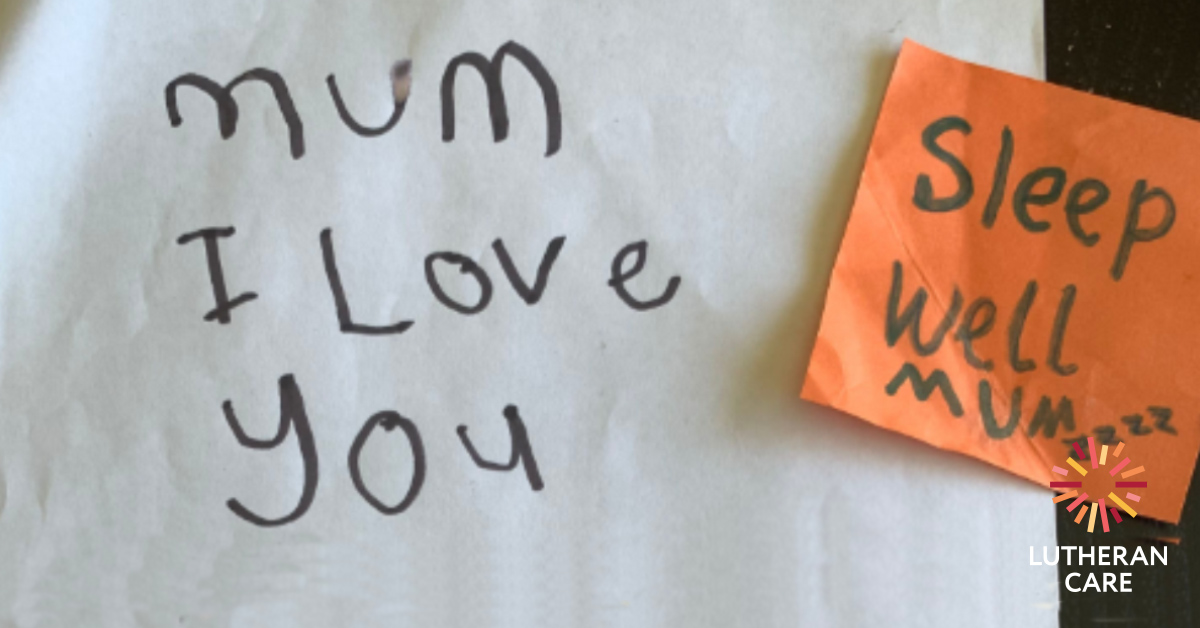As a single mum of triplets experiencing homelessness, there was nothing more important to Jay* than protecting her children as best she could from experiencing trauma, so extra baggage would not be theirs to bear into their futures.
She was adamant. Even though they were living in emergency motel accommodation, the children should remain in a routine with as much normality as possible. Despite it being an hour round trip from the motel to the school they attended, she made sure they were there every day. The children’s school projects and artwork were presented proudly around the one-bedroom motel room they shared. On the walls were post-it notes upon which Jay had written positive affirmations to inspire her family. 
“I can’t give you a house right now, but I can give you safety and predictability,” was Jay’s thinking at the time.
Any parent will understand the mountain of gear that comes along with just one child, let alone three. But Jay worked hard to make the tiny space work for them, despite the challenge of the lack of storage, cooking and clothes-cleaning facilities. The sounds of the passing cars and road trains, the banging of fists on doors, and voices in the night, created a chaotic and audibly overwhelming soundtrack while the family of four slept in a bunk bed and a shared a double bed. Despite the obvious challenges, they were grateful for what they had.
“We had a warm, safe place to sleep, we weren’t on the street and we were together so we were OK,” Jay says.
“I am also hugely blessed that I had a vehicle. It was my lifeline.”
 The children celebrated their seventh birthdays in the motel. Jay supported the children to feel like this stopgap was an adventure, as she tried to push away the feeling of failure that threatened to break her in quiet moments, and the immense anxiety over having to reapply for the accommodation every five days.
The children celebrated their seventh birthdays in the motel. Jay supported the children to feel like this stopgap was an adventure, as she tried to push away the feeling of failure that threatened to break her in quiet moments, and the immense anxiety over having to reapply for the accommodation every five days.
Like a lioness, Jay advocated and fought for her family at every turn, pushing for all of them to receive the professional trauma counselling they needed. She jumped through all of the hoops, filled in all of the forms, checked all of the boxes and gathered all of the references required when dealing with different government departments and housing organisations. She was in survival mode, trying to stay upright with her own mental health in check, whilst caring for three children as a sole parent and shouldering the trauma she herself has carried from a young age.
Jay’s story is another reminder that homelessness can and does happen to anyone.
“It is complex, mulitlayered stuff that leads people into homelessness,” Jay reflects.
Eloquent and well educated, she holds a Bachelor of Registered nursing and with a love of working with children, has been a paediatric nurse and also has various childcare qualifications.
“Working with kids isn’t optional – it’s what I enjoy doing,” Jay explains.
She grew up in Adelaide’s southern suburbs and was heavily into dance in her youth – tap, ballet and jazz – and even worked as a dance teacher. After school, she did half an Early Childhood degree before completing her nursing studies at Flinders University and moving down this career path.

With her long-term partner, Jay had welcomed the triplets: little miracles all three, born at only 24 weeks. Jay stepped back from paid employment to care for them and also to work on her personal health and wellbeing, as a survivor of a complex history of lifelong trauma including experiencing intrafamilial sexual abuse as a child.
“I made a decision to put my kids’ health first and step away from work for the best outcome for my kids, for my family,” Jay explains.
However, her world flipped upside down upon the breakup of her 10-year relationship. For a tough six months, the couple remained separated but living under the same roof with the children while Jay tried to break into the impossible rental market, however her applications were continually overlooked. The stigma around being an unemployed single parent meant she couldn’t get a look in.
Needing to leave that situation and relationship behind, Jay and the children embarked on a succession of fraught short-term stays. They were sleeping on the floor at the home of a childhood friend and her children, however this didn’t work out. They then moved in with Jay’s parents, with whom she shares a strained relationship. There were more unsuccessful attempts to access a rental and ultimately she moved herself and the children out, because of concerns for her children and their safety in that space. They stayed with Jay’s girlfriend for one week, but this was only a short-term option.
The option that remained was moving into the homelessness service system, and for them that meant emergency motel accommodation. The little family was uprooted from their suburban community and placed, or displaced, in an inner city motel. They stayed there for a total of four and a half months.
Jay became connected with the Toward Home Alliance which is a partnership of experienced providers offering services to people experiencing and at risk of homelessness. She describes her current caseworker, from Lutheran Care, as “the ultimate humanitarian…the ultimate justice fighter”.
This caseworker referred Jay and the children to trauma counselling at Relationships SA. This, Jay says, was integral in being able “to come out stronger for it and not broken, or further broken, from it”.
The support they received from her Toward Home caseworker changed everything.
“She really fought for me and the kids.
“Having her fight for us was a huge turning point in my own self worth.
“Mental health wise, the motel really stretched that which was already very thin.
“You feel worthless. You’re looking around and you have nothing and no one.
“You feel like an absolute epic failure as a parent, not being able to even put a roof over your head.
“Having someone fight for me; it makes you want to fight for yourself.”
The affirmation from her caseworker that she and her children were worthy, solidified Jay’s resolve to “create a home for the children; create some change for all of us”.
During the last five weeks of their motel stay, their caseworker put them forward for two transitional homes. Just like the rental market, competition for transitional homes is very tight and it’s the quick and the dead; prior to placing an application there’s no time to find out anything about the property above the basics: there were three bedrooms and a patch of grass for the children to play.
“[Our caseworker] was doing all she could from her perspective; I provided as many documents from every Tom, Dick and Harry in life that I could to support our case, and say ‘hey, we’re a great family we just need a chance here’.
Jay says she had to surrender all control, be at peace that the process was in train and try not to get her hopes up too much as she felt every family in need of a home was as deserving as she was.
In the moment she found out they had been accepted for transitional housing, she felt relieved, and truly grateful.
“It was a huge gratitude moment; all the hard work had paid off.
“It was a confirmation for me that my decisions were the right ones.
“[I felt] the truest form of gratitude to know that someone was giving us a chance.
“I’m a single parent, non working, and struggle with my mental health.
“For someone to look past that and see that I needed a chance…I felt like it was a gift. The gift of safety and security. The gift of rebuilding. The gift of starting over.
“The gift for me to finally be able to create safety within home – something I haven’t known before. A true gift.”
Jay is doing everything she can to make this house a home for her children. By definition, transitional is not a permanent solution, but a stepping stone. A helping hand.
The best thing in the transitional home according to the children is the secret ‘Harry Potter’ room under the stairs. Jay has placed a locker in there for their school bags and shoes to help streamline the morning routine and she’s also added a reading zone for the family to chill out on a beanbag, “and just be”.
As she watches her kids running around in the backyard, giggling, she feels “epically proud” of the way they’ve managed and gotten through this situation as a family.
The children are in Relationships Australia’s Together4Kids program receiving specialised therapeutic support specific to children who have experienced homelessness or unstable housing, domestic family violence or relational trauma.
Jay has also been receiving support to help her process and recover from the trauma she has experienced. Learning about intergenerational trauma and how it can be passed down as a legacy through DNA imprinting, have been important steps in her healing journey.
Jay feels hopeful her children will be spared from a repeat pattern of homelessness in the future.
“They were my saving grace…they were my stability, my routine, my emotional reflection.”
“They’re amazing”.
Read more real life experiences of homelessness here.
*Name has been changed to protect identity.

